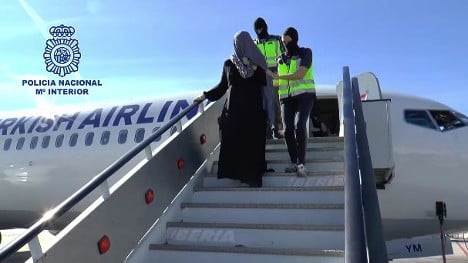In a timely conference held in Madrid on Monday experts from the Spanish think tank the Real Instituto Elcano shed light on the jihadist threat within Spain.
Here are eight takeaways from the report presented at the Third Forum on Global Terrorism.
Boom in arrests
In the last two years, Spanish authorities have arrested 120 people for their alleged involvement in jihadi terrorist related activities, a huge increase on the years before.
Another 13 Spanish nationals were arrested outside of Spain by other security forces.
Born in Spain
Of those detained for suspected jihadist activities between the start of 2013 and November 2015, 40.5 percent were born in Spain.
And 45 percent held Spanish citizenship, some three times the percentage of those convicted of Islamic terrorism during the period 1996 to 2012.
“There has been a boom in homegrown jihadism in Spain, consistent with the global jihadist mobilization that has been affecting Western European countries for the last four years,” said the report authored by terrorism experts Fernando Reinares and Carola Garcia-Calvo.
Spanish jihadis fighting abroad
Although the exact figure is difficult to pinpoint, the number of Spanish nationals estimated to have travelled to Spain to fight for the Islamic State are thought to number around 130, according to intelligence sources consulted in the report.
But the number is low in comparison to some other countries. In the UK an estimated 700 British nationals have left to join jihadist causes in Syria and Iraq. While in France, a Senate report concluded in April that at least 1,430 of the more than 3,000 known European jihadis who had then travelled to Syria and Iraq to fight for Isis were French.
By far the majority of those detained since 2013 have been connected to, or profess allegiance to, Daesh as it is known in Arabic, or the Islamic State of Syria and Iraq (Isis). But that is not the only group. Others were connected to organisations with bases in North Africa,
Not acting alone
In fact nine out of ten suspected jihadists detained in Spain since 2013 were linked to terrorist networks.
“Only 10 percent of those detained can be described as ‘lone wolves’, the rest form part of an organization,” said Fernando Reinares during the terrorism conference.
Geographical hotspots in Spain
The majority (75 percent) of those detained for suspected terrorism offences were resident in Spain’s north African enclaves of Ceuta and Melilla.
On mainland Spain, Barcelona was recognized as a hotspot, with 30 percent of all foreign (mostly Moroccan) jihadists arrested across Spain were detained within Barcelona metropolitan area.
Young married men
The majority of those arrested within Spain were men aged between 20 and 34. Around 60 percent of those involved in terrorist activity were married.

More women joining jihad
Just 16 percent of those detained during 2013 and 2015 were women but significantly in the 16 years prior to that none of those arrested on suspicion of Islamic terrorist activities had been female.
More converts
And 13 percent of all those arrested were recent converts to Islam, again a huge change on the 16 years previously when only one of those arrested had been a convert.


 Please whitelist us to continue reading.
Please whitelist us to continue reading.